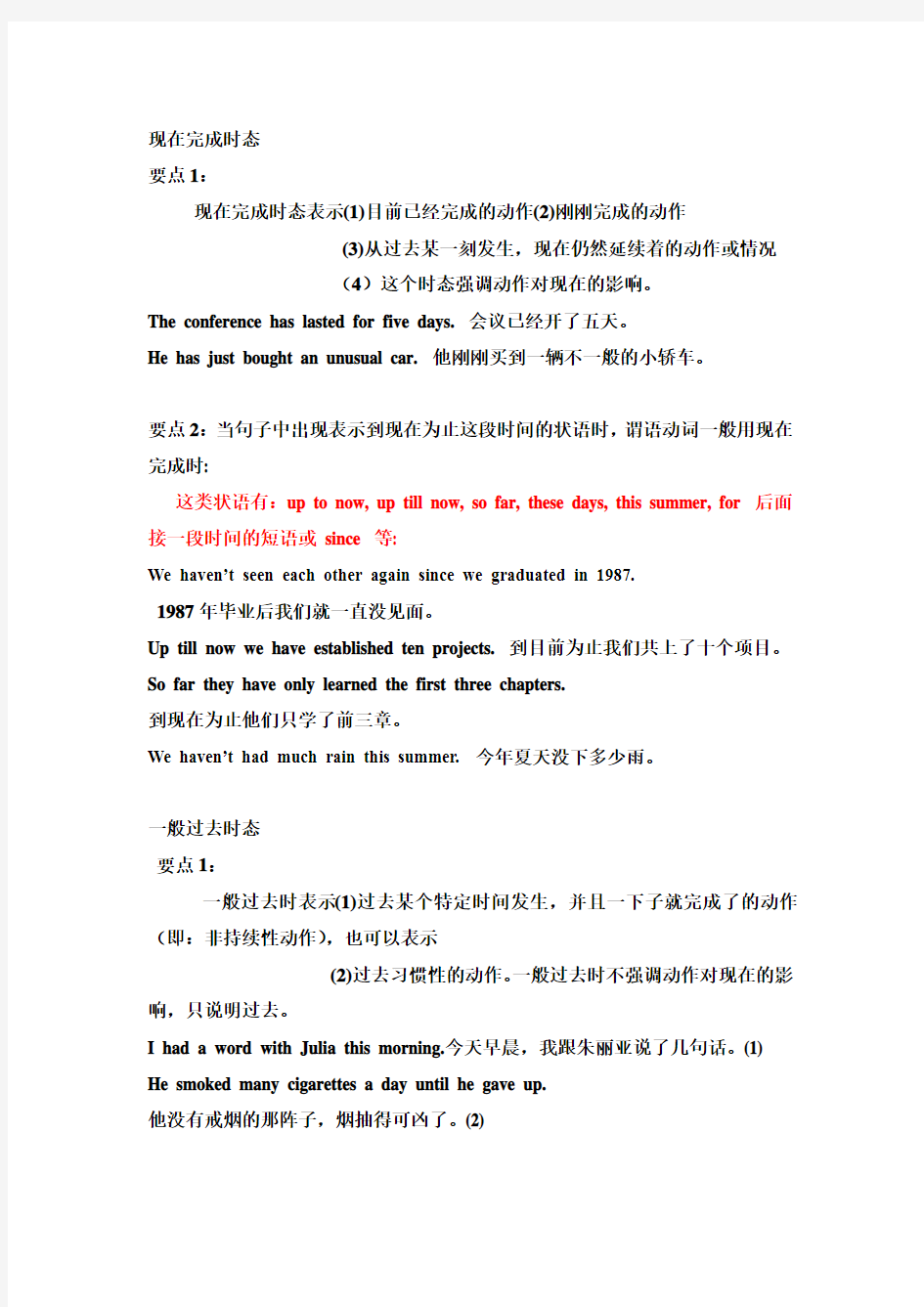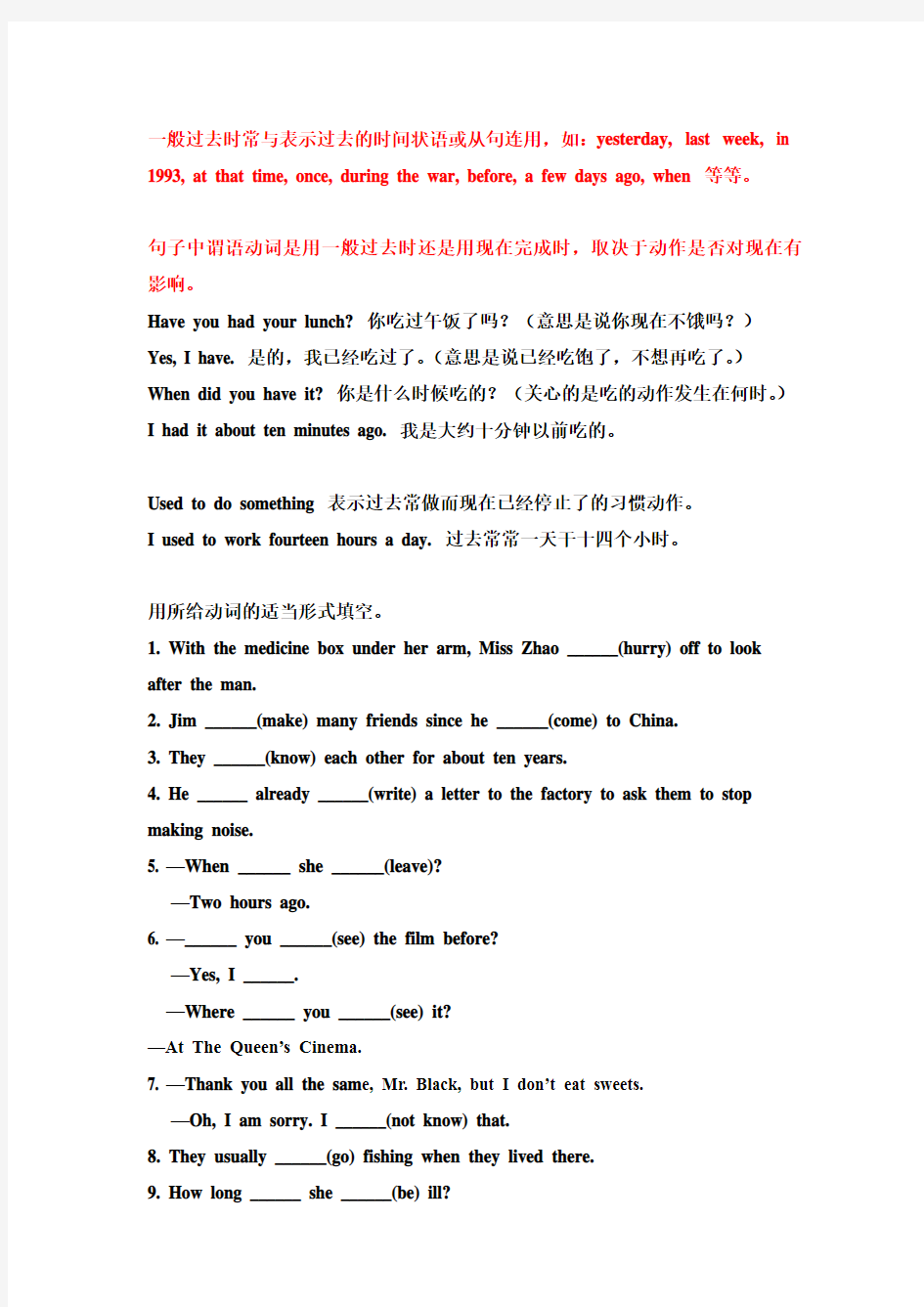

现在完成时态
要点1:
现在完成时态表示(1)目前已经完成的动作(2)刚刚完成的动作
(3)从过去某一刻发生,现在仍然延续着的动作或情况
(4)这个时态强调动作对现在的影响。
The conference has lasted for five days. 会议已经开了五天。
He has just bought an unusual car. 他刚刚买到一辆不一般的小轿车。
要点2:当句子中出现表示到现在为止这段时间的状语时,谓语动词一般用现在完成时:
这类状语有:up to now, up till now, so far, these days, this summer, for 后面接一段时间的短语或since 等:
We haven’t seen each other again since we graduated in 1987.
1987年毕业后我们就一直没见面。
Up till now we have established ten projects. 到目前为止我们共上了十个项目。So far they have only learned the first three chapters.
到现在为止他们只学了前三章。
We haven’t had much rain this summer. 今年夏天没下多少雨。
一般过去时态
要点1:
一般过去时表示(1)过去某个特定时间发生,并且一下子就完成了的动作(即:非持续性动作),也可以表示
(2)过去习惯性的动作。一般过去时不强调动作对现在的影响,只说明过去。
I had a word with Julia this morning.今天早晨,我跟朱丽亚说了几句话。(1) He smoked many cigarettes a day until he gave up.
他没有戒烟的那阵子,烟抽得可凶了。(2)
一般过去时常与表示过去的时间状语或从句连用,如:yesterday, last week, in 1993, at that time, once, during the war, before, a few days ago, when 等等。
句子中谓语动词是用一般过去时还是用现在完成时,取决于动作是否对现在有影响。
Have you had your lunch? 你吃过午饭了吗?(意思是说你现在不饿吗?)Yes, I have. 是的,我已经吃过了。(意思是说已经吃饱了,不想再吃了。)When did you have it? 你是什么时候吃的?(关心的是吃的动作发生在何时。)I had it about ten minutes ago. 我是大约十分钟以前吃的。
Used to do something 表示过去常做而现在已经停止了的习惯动作。
I used to work fourteen hours a day. 过去常常一天干十四个小时。
用所给动词的适当形式填空。
1. With the medicine box under her arm, Miss Zhao ______(hurry) off to look after the man.
2. Jim ______(make) many friends since he ______(come) to China.
3. They ______(know) each other for about ten years.
4. He ______ already ______(write) a letter to the factory to ask them to stop making noise.
5. —When ______ she ______(leave)?
—Two hours ago.
6. —______ you ______(see) the film before?
—Yes, I ______.
—Where ______ you ______(see) it?
—At The Queen’s Cinema.
7. —Thank you all the sam e, Mr. Black, but I don’t eat sweets.
—Oh, I am sorry. I ______(not know) that.
8. They usually ______(go) fishing when they lived there.
9. How long ______ she ______(be) ill?
10. They didn’t start to work in the field until the rain ______(stop).
II. 按要求完成句子。
A)句型转换。
1. With the medicine box under her arm, Miss Zhao ______(hurry) off to look after the man.
2. Jim ______(make) many friends since he ______(come) to China.
3. They ______(know) each other for about ten years.
4. He ______ already ______(write) a letter to the factory to ask them to stop making noise.
5. —When ______ she ______(leave)?
—Two hours ago.
6. —______ you ______(see) the film before?
—Yes, I ______.
—Where ______ you ______(see) it?
—At The Queen’s Cinema.
7. —Thank y ou all the same, Mr. Black, but I don’t eat sweets.
—Oh, I am sorry. I ______(not know) that.
8. They usually ______(go) fishing when they lived there.
9. How long ______ she ______(be) ill?
10. They didn’t start to work in the field until the rain ______(stop).
B)同义句转换,每空一词。
4. My father came back the day before yesterday.
My father has ______ ______ for two days.
5. My uncle bought the new car two months ago.
My uncle has ______ the new car ______ two months ago.
6. They left Changsha an hour ago.
They have ______ ______ ______ Changsha for an hour.
7. The film began ten minutes ago.
The film ______ ______ ______ for ten minutes.
8. The old man died 5 years ago.
The old man ______ ______ ______ for 5 years.
III. 单项填空。
1. —I’m sorry, Cathy, I ______ your radio for such a long time.
—Never mind.
A. have borrowed
B. have lent
C. have kept
D. have returned
2. —Where have you ______ these days?
—I have ______ to Yangzhou with my friends.
A. been, gone
B. been, been
C. gone, been
D. gone, gone
3. —Where is your father? We haven’t seen each other for weeks.
—______.
A. He has been to America
B. He has gone to England
C. He is going to Australia
4. They have ______ since the factory opened.
A. left the school
B. joined the team
C. become workers
D. worked here
5. Jim ______ the Great Wall many times.
A. went to
B. goes to
C. has gone to
D. has been to
6. It ______ ten years since they ______ to France.
A. was, moved
B. was, have moved
C. is, have moved
D. is, moved
7. —______ to the United States?
—No, never, but I went to Canada a few years ago.
A. Have you been
B. Have you gone
C. Did you go
D. Will you go
8. I won’t go to see the film tonight b ecause I ______ my ticket.
A. didn’t lose
B. have lost
C. will lose
D. didn’t have
9. Miss Wu has taught in this school ______.
A. for ten years
B. ten years ago
C. since ten years
D. for ten years ago
10. I ______ today’s homework already. What about you?
A. have finished
B. finish
C. to finish
D. finishing
11. —Ann has gone to Shanghai.
—So ______ her parents.
A. has
B. had
C. did
D. have
列表分析一般过去时态和现在完成时态的区别
判断下面句子的对错。
Tom has written a letter to his parents last night.
Key: I. 1. hurried 2. has made, came 3. have known 4. has, written
5. did, leave
6. Have, seen; have; did, see
7. didn’t know
8. went 9. has, been 10. stopped
II. 1. How often did, go 2. hasn’t, yet 3. have you 4. been back
5. had, since
6. been away from
7. has been on
8. has been dead III. 1-5 CBBDD 6-11 DABAAD
5. did, leave
6. Have, seen; have; did, see
7. didn’t know
8. went 9. has, been 10. stopped
II. 1. How often did, go 2. hasn’t, yet 3. have you 4. been back
5. had, since
6. been away from
7. has been on
8. has been dead III. 1-5 CBBDD 6-11 DABAAD